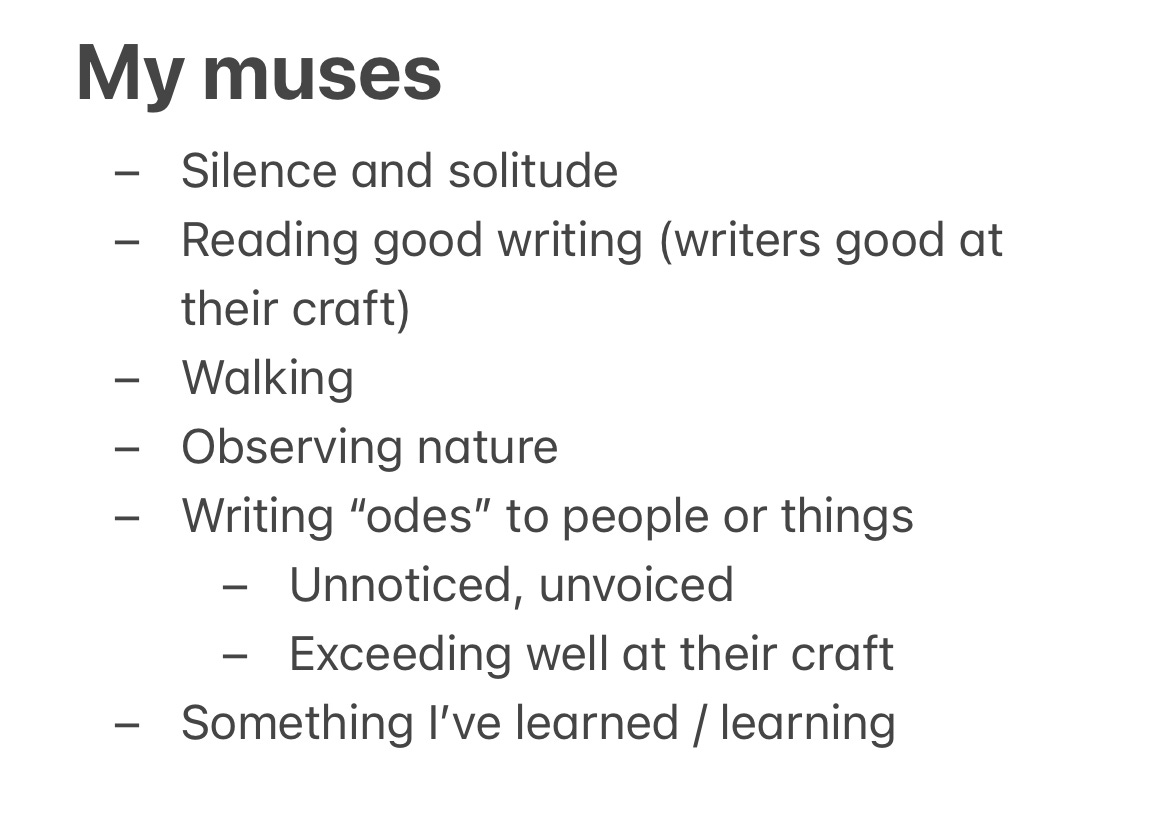A few years back, I spoke with a mentor figure about how to become a better writer. I was hungry for advice, but I wasn’t all that interested in mechanics. Generally, I knew where to put a punctuation mark and on the whole, I could get a clear idea across.
At the time though, you could say I struggled to call myself a writer. I was still swimming in the deep end of imposter syndrome, unsure where to find my footing and if I had the ability to call myself a writer at all. Although I still wade into those waters from time to time, all I wanted at this point was some pointers on where to begin.
That phone call left me with some really good takeaways. More than anything, it gave me space to wrestle through my own self-made stories, but when it came to creative advice, she offered a few good words: to write often, to write honestly, and to “write whenever the muse strikes.”
If you’ve heard of a “muse,” you know it’s a common phrase for makers. A creative stimulus of sorts; a catalyst that sparks the flames of creative fire. I imagined the term mostly applied to painters and visual artists, so when she asked, “Paige, what’s your muse?” I had little to no answer to offer.
I’ve spent the last several years trying to answer that question for my own creative practice. If I’m a writer, what is my muse? What are the things that infuse me with energy? What primes me to pick up a pen? Where do I find myself most curious? And when do I crave to create?
Whether you’re a writer or not, I’m sure you can relate to these states of flow or creative sparks. There’s something out there that energizes you like nothing else; something you can revisit time after time that will put yourself in passion’s way.
I’ve spent the last few years trying to build out my “muse” bullpen, capturing ideas that generally get my creative juices flowing, or channels that spark a citable difference. I store that list in my notes app (see below), constantly adding to it in the event that I find myself stuck or in need of a friendly reminder.
This week, I started reading a book called The Holy Longing by Ronald Rolheiser. Its main idea (so far) is about how to channel our inner urges or naggings or energies – good or bad – into helpful and creative ways. If you’re more woo-woo (like me), you’ll love it. If you’re feeling stuck in life, you’ll want to read it. But essentially, the main premise is that we’re all spiritual beings. We just don’t always know what to do with all our energy.
These two ideas tied together well for me as I approach something like writing. Where does creative energy start? Where can I access my best? And does the muse shape the spirit, or does energy interrupt imagination?
This might make as much sense to you as someone trying to explain the rules of a card game to me. If so, that’s okay. All muses are welcome here.
However, I wanted to share a little something I wrote (a liturgy? a prayer?) for when I approach my craft. I’m not always good at getting started, but I wanted to put myself in the way of inspiration. Sometimes the muse strikes all on its own. And sometimes, it needs striking itself.
A Reminder to Myself Before I Write
Take a few holy moments to steady yourself
Sit in the quiet or dance around
Listen or linger
Learn if you want
Teach yourself to come into a state of calm
However you connect and collect
Come to the place you communicate best
Walk around, if you want
Shake the ideas loose
Call out words that wish to stick to the inner caverns
Remind them, too, they can climb onto the page
Whatever feels like it needs checked at the door, dismiss it
All your written words are yours
They need not be perfect or presentable
Or proper in all people's eyes
Test them out
Take them, terrified, for a spin
Make a pass with each passing moment
We're not aiming perfect, you know
There's time to play
Tell the truth above all else
Tell it tethered to what you know
Circle what’s good and necessary
Outline its outer edges
Truth needs dimension
So don't be scared when it looks different each day
One day we'll know Truth in its full
Still, write
Even if fragmented for now
Lastly, don’t try so hard
Life’s not so serious
And neither are you
Settle in and get comfortable
Wherever your legs or luggage land
Write from, and not for.
Write today, not tomorrow.
Trust the process.
Trust your placement.
Trust you are more prepared
Than you have ever been before.
You are a writer.
You are a thinker.
You are here.
Write now.




